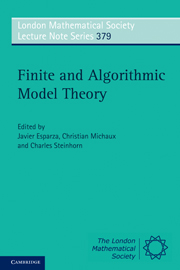Book contents
- Frontmatter
- Contents
- Preface
- 1 Automata-based presentations of infinite structures
- 2 Logical aspects of spatial databases
- 3 Some connections between finite and infinite model theory
- 4 Definability in classes of finite structures
- 5 Algorithmic meta-theorems
- 6 Model theoretic methods for fragments of FO and special classes of (finite) structures
- Bibliography
5 - Algorithmic meta-theorems
Published online by Cambridge University Press: 01 June 2011
- Frontmatter
- Contents
- Preface
- 1 Automata-based presentations of infinite structures
- 2 Logical aspects of spatial databases
- 3 Some connections between finite and infinite model theory
- 4 Definability in classes of finite structures
- 5 Algorithmic meta-theorems
- 6 Model theoretic methods for fragments of FO and special classes of (finite) structures
- Bibliography
Summary
Abstract
Algorithmic meta-theorems are general algorithmic results applying to a whole range of problems, rather than just to a single problem alone. They often have a logical and a structural component, that is they are results of the form: every computational problem that can be formalised in a given logic ℒ can be solved efficiently on every class C of structures satisfying certain conditions.
This paper gives a survey of algorithmic meta-theorems obtained in recent years and the methods used to prove them. As many meta-theorems use results from graph minor theory, we give a brief introduction to the theory developed by Robertson and Seymour for their proof of the graph minor theorem and state the main algorithmic consequences of this theory as far as they are needed in the theory of algorithmic meta-theorems.
Introduction
Algorithmic meta-theorems are general algorithmic results applying to a whole range of problems, rather than just to a single problem alone. In this paper we will concentrate on meta-theorems that have a logical and a structural component, that is on results of the form: every computational problem that can be formalised in a given logic ℒ can be solved efficiently on every class C of structures satisfying certain conditions.
The first such theorem is Courcelle's well-known result [13] stating that every problem definable in monadic second-order logic can be solved efficiently on any class of graphs of bounded tree-width.
- Type
- Chapter
- Information
- Finite and Algorithmic Model Theory , pp. 177 - 270Publisher: Cambridge University PressPrint publication year: 2011
- 14
- Cited by

